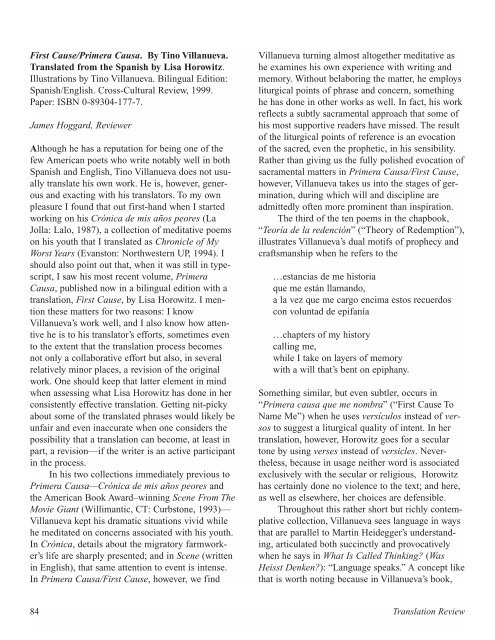Translation Review - The University of Texas at Dallas
Translation Review - The University of Texas at Dallas
Translation Review - The University of Texas at Dallas
You also want an ePaper? Increase the reach of your titles
YUMPU automatically turns print PDFs into web optimized ePapers that Google loves.
First Cause/Primera Causa. By Tino Villanueva.<br />
Transl<strong>at</strong>ed from the Spanish by Lisa Horowitz.<br />
Illustr<strong>at</strong>ions by Tino Villanueva. Bilingual Edition:<br />
Spanish/English. Cross-Cultural <strong>Review</strong>, 1999.<br />
Paper: ISBN 0-89304-177-7.<br />
James Hoggard, <strong>Review</strong>er<br />
Although he has a reput<strong>at</strong>ion for being one <strong>of</strong> the<br />
few American poets who write notably well in both<br />
Spanish and English, Tino Villanueva does not usually<br />
transl<strong>at</strong>e his own work. He is, however, generous<br />
and exacting with his transl<strong>at</strong>ors. To my own<br />
pleasure I found th<strong>at</strong> out first-hand when I started<br />
working on his Crónica de mis años peores (La<br />
Jolla: Lalo, 1987), a collection <strong>of</strong> medit<strong>at</strong>ive poems<br />
on his youth th<strong>at</strong> I transl<strong>at</strong>ed as Chronicle <strong>of</strong> My<br />
Worst Years (Evanston: Northwestern UP, 1994). I<br />
should also point out th<strong>at</strong>, when it was still in typescript,<br />
I saw his most recent volume, Primera<br />
Causa, published now in a bilingual edition with a<br />
transl<strong>at</strong>ion, First Cause, by Lisa Horowitz. I mention<br />
these m<strong>at</strong>ters for two reasons: I know<br />
Villanueva’s work well, and I also know how <strong>at</strong>tentive<br />
he is to his transl<strong>at</strong>or’s efforts, sometimes even<br />
to the extent th<strong>at</strong> the transl<strong>at</strong>ion process becomes<br />
not only a collabor<strong>at</strong>ive effort but also, in several<br />
rel<strong>at</strong>ively minor places, a revision <strong>of</strong> the original<br />
work. One should keep th<strong>at</strong> l<strong>at</strong>ter element in mind<br />
when assessing wh<strong>at</strong> Lisa Horowitz has done in her<br />
consistently effective transl<strong>at</strong>ion. Getting nit-picky<br />
about some <strong>of</strong> the transl<strong>at</strong>ed phrases would likely be<br />
unfair and even inaccur<strong>at</strong>e when one considers the<br />
possibility th<strong>at</strong> a transl<strong>at</strong>ion can become, <strong>at</strong> least in<br />
part, a revision—if the writer is an active participant<br />
in the process.<br />
In his two collections immedi<strong>at</strong>ely previous to<br />
Primera Causa—Crónica de mis años peores and<br />
the American Book Award–winning Scene From <strong>The</strong><br />
Movie Giant (Willimantic, CT: Curbstone, 1993)—<br />
Villanueva kept his dram<strong>at</strong>ic situ<strong>at</strong>ions vivid while<br />
he medit<strong>at</strong>ed on concerns associ<strong>at</strong>ed with his youth.<br />
In Crónica, details about the migr<strong>at</strong>ory farmworker’s<br />
life are sharply presented; and in Scene (written<br />
in English), th<strong>at</strong> same <strong>at</strong>tention to event is intense.<br />
In Primera Causa/First Cause, however, we find<br />
Villanueva turning almost altogether medit<strong>at</strong>ive as<br />
he examines his own experience with writing and<br />
memory. Without belaboring the m<strong>at</strong>ter, he employs<br />
liturgical points <strong>of</strong> phrase and concern, something<br />
he has done in other works as well. In fact, his work<br />
reflects a subtly sacramental approach th<strong>at</strong> some <strong>of</strong><br />
his most supportive readers have missed. <strong>The</strong> result<br />
<strong>of</strong> the liturgical points <strong>of</strong> reference is an evoc<strong>at</strong>ion<br />
<strong>of</strong> the sacred, even the prophetic, in his sensibility.<br />
R<strong>at</strong>her than giving us the fully polished evoc<strong>at</strong>ion <strong>of</strong><br />
sacramental m<strong>at</strong>ters in Primera Causa/First Cause,<br />
however, Villanueva takes us into the stages <strong>of</strong> germin<strong>at</strong>ion,<br />
during which will and discipline are<br />
admittedly <strong>of</strong>ten more prominent than inspir<strong>at</strong>ion.<br />
<strong>The</strong> third <strong>of</strong> the ten poems in the chapbook,<br />
“Teoría de la redención” (“<strong>The</strong>ory <strong>of</strong> Redemption”),<br />
illustr<strong>at</strong>es Villanueva’s dual motifs <strong>of</strong> prophecy and<br />
craftsmanship when he refers to the<br />
…estancias de me historia<br />
que me están llamando,<br />
a la vez que me cargo encima estos recuerdos<br />
con voluntad de epifanía<br />
…chapters <strong>of</strong> my history<br />
calling me,<br />
while I take on layers <strong>of</strong> memory<br />
with a will th<strong>at</strong>’s bent on epiphany.<br />
Something similar, but even subtler, occurs in<br />
“Primera causa que me nombra” (“First Cause To<br />
Name Me”) when he uses versículos instead <strong>of</strong> versos<br />
to suggest a liturgical quality <strong>of</strong> intent. In her<br />
transl<strong>at</strong>ion, however, Horowitz goes for a secular<br />
tone by using verses instead <strong>of</strong> versicles. Nevertheless,<br />
because in usage neither word is associ<strong>at</strong>ed<br />
exclusively with the secular or religious, Horowitz<br />
has certainly done no violence to the text; and here,<br />
as well as elsewhere, her choices are defensible.<br />
Throughout this r<strong>at</strong>her short but richly contempl<strong>at</strong>ive<br />
collection, Villanueva sees language in ways<br />
th<strong>at</strong> are parallel to Martin Heidegger’s understanding,<br />
articul<strong>at</strong>ed both succinctly and provoc<strong>at</strong>ively<br />
when he says in Wh<strong>at</strong> Is Called Thinking? (Was<br />
Heisst Denken?): “Language speaks.” A concept like<br />
th<strong>at</strong> is worth noting because in Villanueva’s book,<br />
84 <strong>Transl<strong>at</strong>ion</strong> <strong>Review</strong>

















